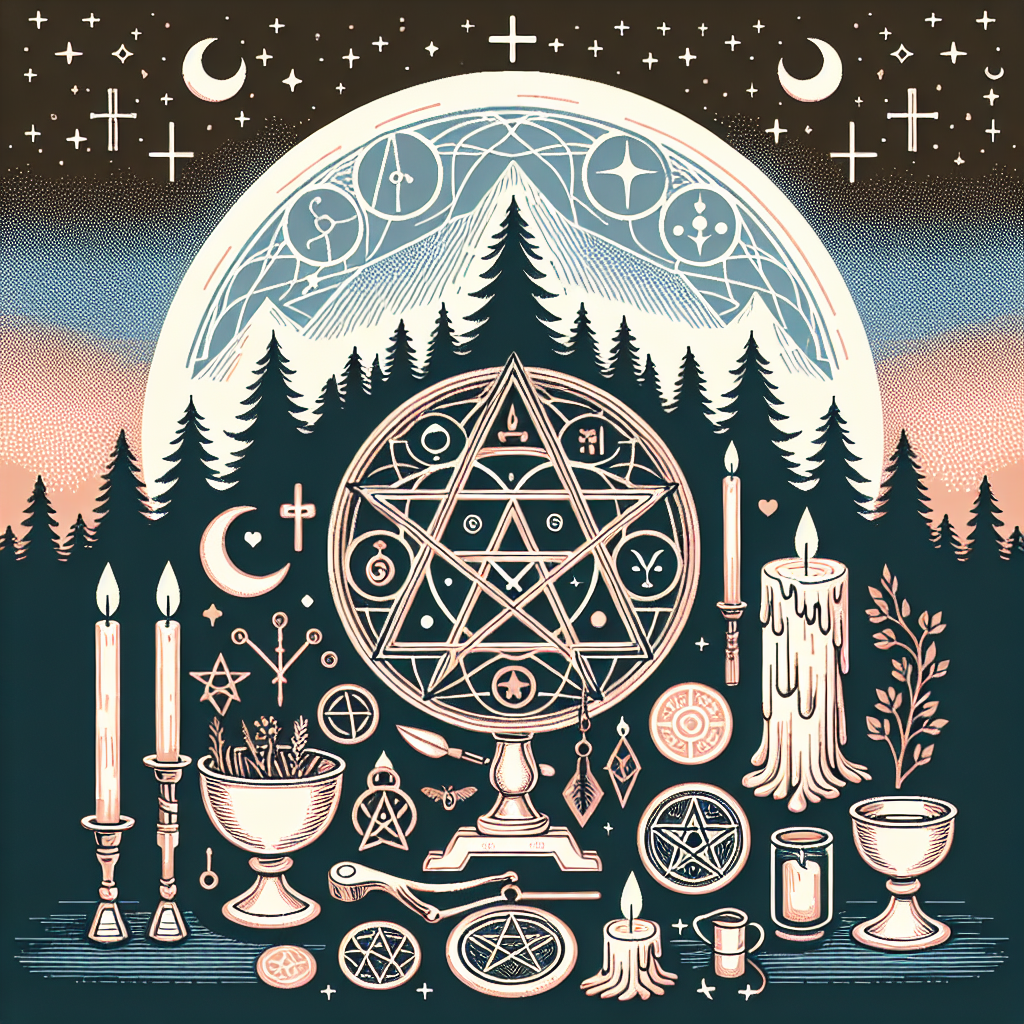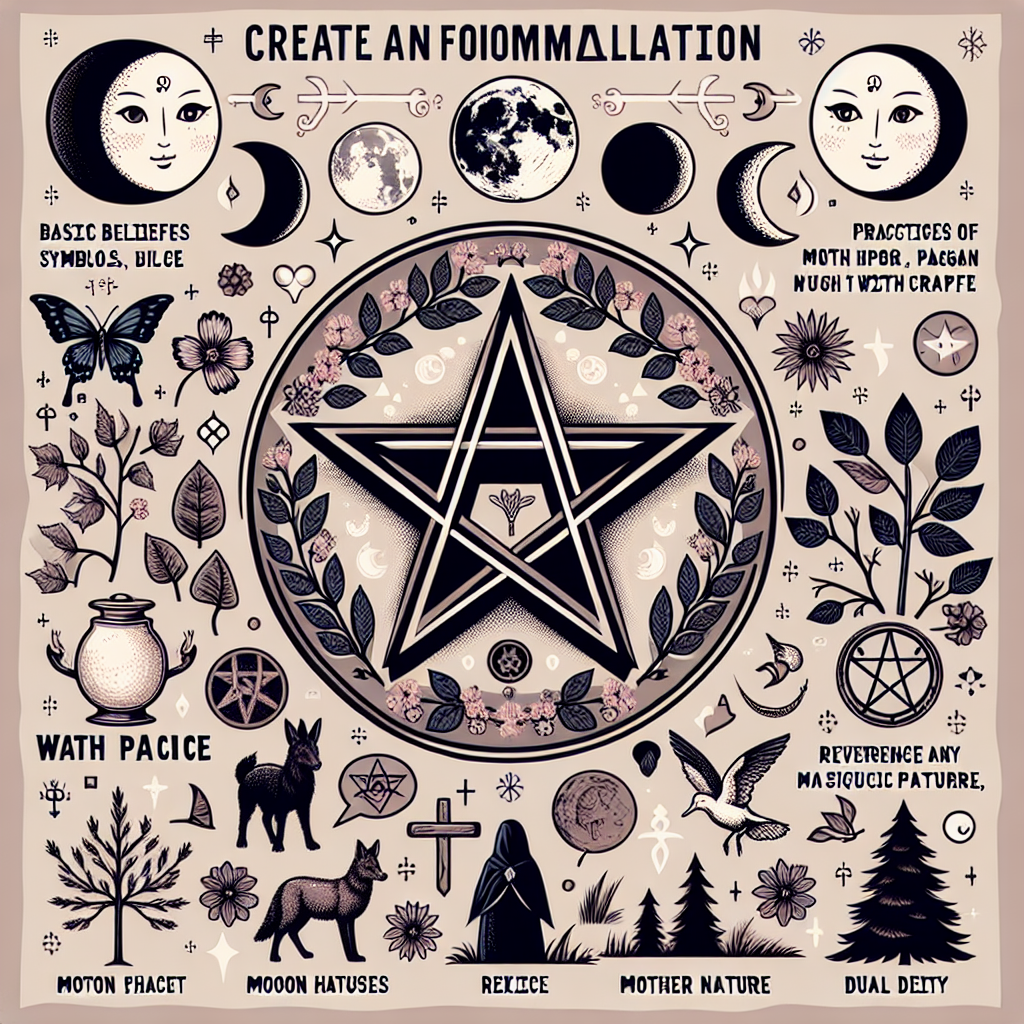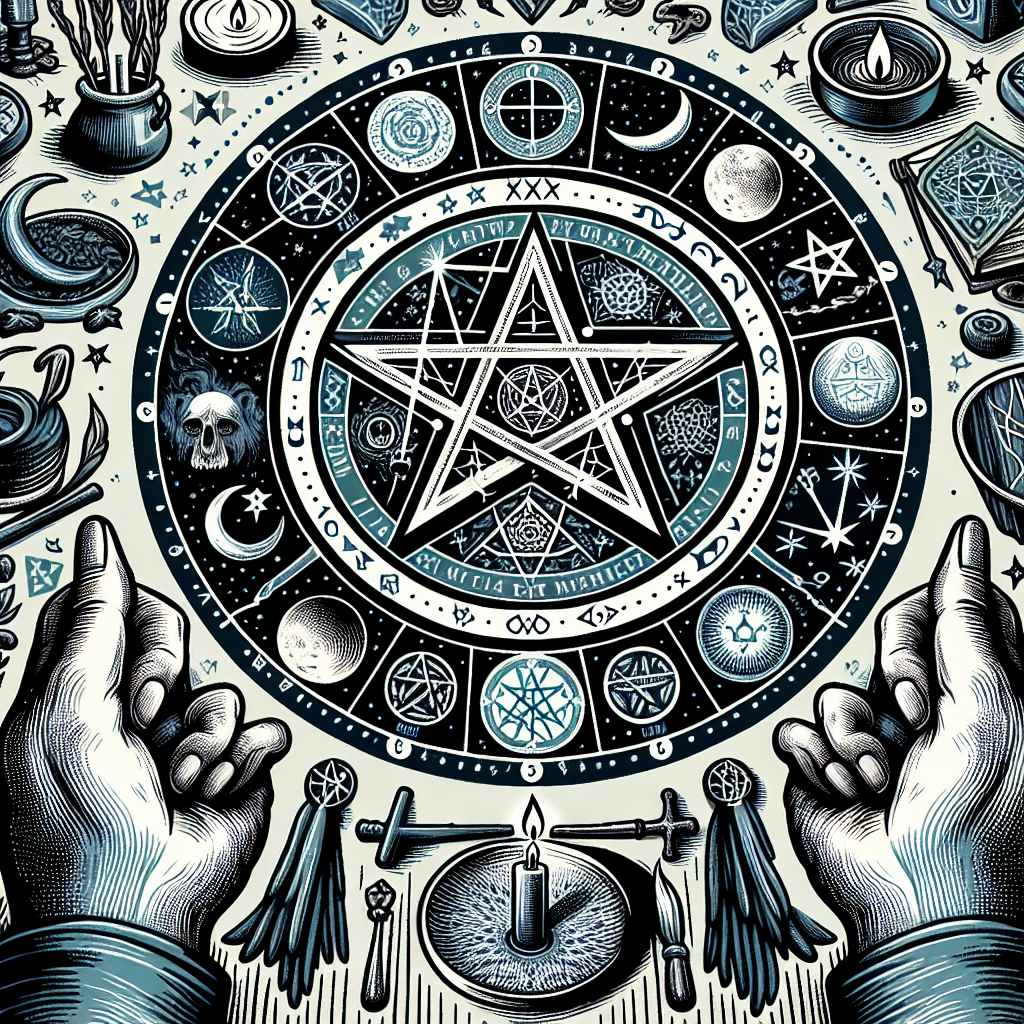As an Amazon Associate I earn from qualifying purchases.

Wicca, sometimes referred to as “The Craft,” is a modern pagan, witchcraft religion that has gained significant attention since its inception in the first half of the 20th century. It draws upon a variety of ancient pagan practices, occultism, and 19th-century folk magic. Founded by British civil servant Gerald Gardner in the 1940s and 1950s, Wicca blends ceremonial rituals with a reverence for both the divine feminine, often embodied as a goddess, and her male counterpart, a god.
Over the years, Wicca has evolved into a diverse and decentralized faith that emphasizes a connection with nature, the practice of magic, and a personal interpretation of divinity. Its followers, known as Wiccans, often practice ritual ceremonies within a magical circle and celebrate seasonal festivals known as Sabbats, which make up the Wheel of the Year. Alongside these Sabbats, there are Esbats, which are rituals conducted for the Full Moon. Wiccans typically follow the Wiccan Rede, an ethical code that states “An it harm none, do what ye will,” promoting the free will of the individual as long as it doesn’t cause harm to others.
An engaging characteristic of Wicca is its openness to solitary practice, as opposed to requiring group worship or a strict hierarchy. This inclusivity has led to a proliferation of self-initiated Wiccans who may practice in isolation, or who form small, semi-autonomous groups known as covens. In recent years, surveys and studies show a noticeable rise in people identifying as Wiccans or practicing Wicca in the United States and the UK, indicating a growing trend toward alternative spiritual paths that offer a more individualistic approach to religion.
Though some may argue about whether Wicca constitutes a “religion” in the traditional sense due to its young age and decentralized structure, many Wiccans and scholars of religion argue that it meets the criteria of a religion due to its well-defined belief system, ethical code, structured rituals, and the existence of clergy. While it bypasses the more conventional aspects of organized worship, Wicca offers a spiritual framework that provides meaning and direction to its followers, much like other world religions. With environmental concerns and the search for personal spiritual authenticity on the rise, Wicca's nature-centric and adaptable approach continues to resonate with people around the globe.
`
Exploring Wicca's Religious Status: Is It A Recognized Spiritual Path?
`
Wicella is indeed a religion, drawing its spirituality from ancient pagan and 20th-century ceremonial traditions. Recognized as a legally established religion in many countries, Wicca encompasses a diverse belief system centered on the worship of nature, the veneration of deities, and the practice of magic and ritual. As an earth-based faith, it emphasizes a harmonious relationship with the environment and the cycle of the seasons. Practitioners, known as Wiccans, often follow a moral code but interpret and implement their spiritual path individually or within covens. To gain a deeper understanding of Wicca's intricate spiritual landscape and learn how it qualifies as a religion, join us in the forthcoming discussion, where we will delve into its history, traditions, and the reasons for its growing recognition worldwide.
Is Wicca a Religion? Understanding Its Spiritual Foundations
Wicca is indeed recognized as a religion in many parts of the world, with its spiritual foundations wrapped in a modern pagan, witchcraft tradition. Established in the mid-20th century, Wicca draws influences from ancient pagan religions, ceremonial magic, and hermetic mysticism. It was introduced to the public by Gerald Gardner in the 1950s as a new religious movement, emphasizing its roots in pre-Christian spiritual practices.
The spiritual framework of Wicca celebrates the earth, nature, and the cycles of the year, referred to as the Wheel of the Year. Wiccans commonly believe in a dual deity, the God and the Goddess, symbolizing the male and female forces in nature. This belief is not dogmatic, however, and some practitioners of Wicca may be monotheistic, polytheistic, or pantheistic.
Central to Wiccan belief is the Wiccan Rede, a statement that provides the key moral system within the religion — “An it harm none, do what ye will”. This ethos supports the understanding that Wiccans are free to do as they wish, as long as their actions do not harm others, including themselves. Alongside this sits the Law of Threefold Return, which indicates that whatever energy or action a person puts out into the world, be it positive or negative, will be returned to that person threefold.
Rituals and ceremonies are integral aspects of Wicca, often performed during Sabbats and Esbats which mark significant times in the Wheel of the Year. Typical rituals include casting a circle, calling on the elements and deities, celebrating seasonal festivals, and conducting magic with the intent of healing or personal growth.
Wiccan practice is highly individualized, with solitary practitioners creating their own rituals and belief systems, distinct from those who join covens. Despite this variation in practice, Wiccans typically hold a deep respect for the environment, believing in the sacredness of all living things and often engaging in practices that reflect an ecological conscience.
Legal recognition of Wicca as a religion varies worldwide, but in many countries, including the United States and Canada, Wicca is afforded the same legal rights and protections as more widely recognized religions. This recognition allows Wiccans to conduct their practices freely and underscores the validity of Wicca as a spiritual path.
In terms of demographics, Wicca has been one of the fastest-growing religions in various parts of the Western world. Surveys, such as those conducted by the Pew Research Center, often struggle to accurately quantify Wiccan adherents due to its decentralized nature and the private practice of many Wiccans. However, estimates suggest tens of thousands to several million people practice Wicca or related forms of modern paganism around the world, reflecting significant growth since the religion's inception.
Wicca is a modern Pagan religion that draws upon a diverse set of ancient pagan beliefs, rituals, and witchcraft practices. It focuses on the worship of the Goddess and the God, the cycle of the seasons, and a respect for nature.
Yes, Wicca is recognized as an official religion in many countries, including the United States where it has been granted tax-exempt status by the Internal Revenue Service and is afforded the same protections as other religions under the law.
Yes, Wiccans can practice their religion individually as solitary practitioners or collectively in groups known as covens or circles.
Wicca does not have a universal sacred text like some other religions. Wiccans often use a variety of sources for their beliefs and practices, including but not limited to books, poems, and personal writings known as a “Book of Shadows.”
Wicca is a specific religious witchcraft tradition within the larger umbrella of Paganism. It is characterized by its specific rituals, ethical code, worship of a Goddess and a God, and the observance of eight seasonal festivals known as the Wheel of the Year.
Magic in Wicca is considered a natural practice that is intertwined with their spirituality. Wiccans believe in the power of magic to create change according to one's will and often use it in rituals and for various purposes such as healing, protection, and personal development.
Initiation is traditional in many Wiccan paths, especially when joining a coven. However, some Wiccans choose to self-initiate through a personal dedication to the Wiccan path, and others simply identify with Wiccan beliefs and practices without formal initiation.
Wiccans worship through rituals that may include casting a circle, invoking the elements and deities, celebrating seasonal festivals, chanting, dancing, and performing magic. Worship practices can vary widely depending on the tradition or the individual's preferences.
Wicca is a flexible religion and some practitioners blend elements of Wicca with aspects of other spiritual paths, making it a part of their eclectic spiritual practice. However, exclusivity may be required by certain Wiccan traditions or covens.
Generally, anyone with a genuine interest in the Wiccan path can become a Wiccan. There are no specific qualifications needed. However, some covens may have their own requirements such as minimum age or completion of a period of study before initiation.

Conclusion
Wicca indeed stands as a legitimate religion, deeply rooted in its unique spiritual foundations and practices. Throughout the article, we have dissected Wicca's core tenets, including its pantheistic belief system, reverence for nature, ritualistic practices, and ethical framework encapsulated by the Wiccan Rede. The evidence presented underscores the structured and serious approach adherents take towards their faith, reflecting characteristics typically associated with more widely recognized religions. From seasonal celebrations marked by the Wheel of the Year to the emphasis on personal growth and harmony, Wicca offers a comprehensive, spiritually fulfilling path for its followers.
Additionally, the acceptance of Wicca as a religion by various international governments and institutions further cements its status in the global religious landscape. The embodiment of beliefs through organized group worship, the establishment of sacred texts, and the transmission of traditions through initiation and training are all indicative of Wicca's tangible religious structure. As with any other religion, Wicca provides a framework for understanding the world, shaping moral values, and fostering a sense of community among its practitioners. Therefore, Wicca should be recognized and respected as a religion, one that continues to grow and adapt in a diverse, ever-changing spiritual ecosystem.
Amazon and the Amazon logo are trademarks of Amazon.com, Inc, or its affiliates.


